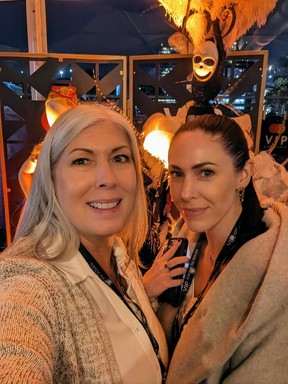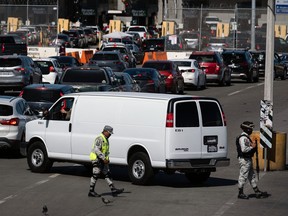B.C. woman detained at U.S. border, sent to Arizona detention facility in chains
Her mother says 35-year-old Jasmine Mooney has been detained in inhumane conditions since March 3
By
Last updated 2 days ago
You can save this article by registering for free here. Or sign-in if you have an account.

Family and friends of a Vancouver entrepreneur are demanding answers after she was unexpectedly detained by U.S. immigration officials while attempting to cross the border with a job offer and visa paperwork in hand.
Jasmine Mooney, a 35-year-old business consultant and co-founder of a drink brand, has been detained for 10 days under what her supporters describe as “inhumane conditions,” with no clear explanation of why U.S. Customs and Border Protection arrested her.
“I haven’t been able to sleep thinking about what my daughter is being put through. We treat cattle better than this in Canada,” Mooney’s mother, Alexis Eagles, said on Thursday.
Eagles, who said she found out about Mooney’s detention through a family friend, noted that her daughter had been working in the U.S. but was detained at the San Ysidro U.S.-Mexico border crossing near San Diego, Calif., on March 3.
Eagles said an immigration lawyer was finally able to reach Mooney late Thursday, but despite having no criminal record and facing no charges, Mooney remains in custody with no clear timeline for release.
“We have no issue with her being denied entry, we have no issue with her initially being detained. But we have a huge issue with the inhumane treatment she is receiving and that she knows nothing, has not been charged and has not been able to speak with us directly,” her mother said.
“It’s been 11 days, just release her. It doesn’t make sense to spend taxpayer dollars to continue to detain her when she’s not a criminal.”
Subscribe now to read the latest news in your city and across Canada.
- Unlimited online access to articles from across Canada with one account.
- Get exclusive access to the Vancouver Sun ePaper, an electronic replica of the print edition that you can share, download and comment on.
- Enjoy insights and behind-the-scenes analysis from our award-winning journalists.
- Support local journalists and the next generation of journalists.
- Daily puzzles including the New York Times Crossword.
Subscribe now to read the latest news in your city and across Canada.
- Unlimited online access to articles from across Canada with one account.
- Get exclusive access to the Vancouver Sun ePaper, an electronic replica of the print edition that you can share, download and comment on.
- Enjoy insights and behind-the-scenes analysis from our award-winning journalists.
- Support local journalists and the next generation of journalists.
- Daily puzzles including the New York Times Crossword.
Create an account or sign in to continue with your reading experience.
- Access articles from across Canada with one account.
- Share your thoughts and join the conversation in the comments.
- Enjoy additional articles per month.
- Get email updates from your favourite authors.
Create an account or sign in to continue with your reading experience.
- Access articles from across Canada with one account
- Share your thoughts and join the conversation in the comments
- Enjoy additional articles per month
- Get email updates from your favourite authors
Sign In or Create an Account
BRING JASMINE HOME! (Post is now shareable, thank you!) My daughter, Jasmine, a 35-year-old Canadian, attempted to…
Posted by Alexis Eagles on Wednesday, March 12, 2025
Eagles said the family has received an update from a third-party that Mooney may have a tentative release date of March 24, which — if true — remains “still too far away.”
-
Advertisement embed-more-topicStory continues belowThis advertisement has not loaded yet, but your article continues below.
“By then, she’ll have been in custody for three weeks,” Eagles said. “That’s twice as long as she’s been there already. And so we want to get her home as soon as possible.”
Mooney was detained by border officials while trying to enter the U.S., as she had previously done successfully when applying for a Trade NAFTA, or TN, work visa.
After spending three nights in detention at the world’s busiest land border, Eagles said her daughter was transferred to a facility in San Diego and then to the San Luis Regional Detention Center south of Yuma, Arizona, where she has since been sleeping on the floor of a cell alongside nearly 30 other women.
Eagles said that each time her daughter was transferred, she was handcuffed and in chains.

From detention, Mooney spoke with ABC News 10 on Wednesday, describing the freezing conditions and overcrowding at the facility.
“I was put in a cell, and I had to sleep on a mat with no blanket, no pillow, with an aluminum foil wrapped over my body like a dead body for 2½ days,” she told a reporter.
As her detention continues, Mooney remains confined to a concrete cell with no natural light, no mats, no blankets, and minimal bathroom facilities.
“Every single guard that sees me is like ‘What are you doing here? I don’t understand — you’re Canadian. How are you here?’” she told ABC News.
Mooney had been working in Los Angeles with a health drink company under a TN visa since the spring of 2024, which was later revoked. She told her mother that she went to the border with a new job offer and the necessary visa paperwork to secure a new visa.
The visa allows Canadians and Mexicans to work in the U.S. for a limited time in certain, high-demand jobs.
Her first visa was granted at the San Ysidro crossing in the spring of 2024 after meeting with a Los Angeles lawyer. She hoped to follow the same process this time in March.
In the interview with ABC News 10, Mooney explained that a U.S. border officer revoked her first visa in November — months after it was granted — when she tried to return to L.A. for work after a visit home to Vancouver.
“She had a valid three-year TN visa, but when she went back to the States, she was told she was not welcome anymore,” Eagles said, noting that no official reason was given for the reversal of the visa’s authorization.
The officer informed Mooney that she would need to go to a U.S. consulate to reapply for legal status to work in the country.
When her daughter attempted to apply for another work visa at the San Diego border crossing this month, Eagles said, “all hell broke loose.”
“She had all the paperwork and everything. It just doesn’t make sense,” the mother added.
U.S. Immigration and Customs Enforcement said Mooney was detained on March 3 “for not having legal documentation to be in the United States.”
Mooney was processed in accordance with President Donald Trump’s executive order on border security dated Jan. 21, said spokeswoman Sandra Grisolia in an emailed statement. “All aliens in violation of U.S. immigration law may be subject to arrest, detention and, if found removable by final order, removal from the U.S., regardless of nationality.”
San Diego immigration lawyer Andrew Nietor said Thursday that Mooney’s case is not an isolated incident.
Since Donald Trump became U.S. president and began implementing stricter immigration policies in late January, Nietor said he has noticed an increase in cases of non-U.S. citizens being detained by immigration authorities.
“One or two months ago, if CBP officers found an issue with a Canadian’s work visa, the typical route taken is revoking the visa and ordering that person to leave the country,” said Nietor. “To detain someone like this would have been considered extreme not long ago, but’s it happening much more frequently nowadays.”
Nietor noted that while there is no limit on how long U.S. immigration authorities can detain a non-U.S. citizen, individuals have the legal right to talk to a lawyer while in detention.
Mooney’s associate, Chicago-based BJ McCaslin, said he hopes the detainment was the result of a mistake or misunderstanding, stressing that Mooney is not doing anything illegal. The pair had plans to meet at a health product expo in Anaheim, Calif.
“She’s definitely not criminal,” McCaslin said. “She’s coming to a health-food product exposition. She’s an upstanding person who is very well-respected in our industry.”
McCaslin has been in contact with Mooney through a messaging app designed for detainees, allowing them to communicate with people outside the facility. In her messages, Mooney described the whole process as “the most inhumane.”
In one message, she explained that about 30 women were crammed together on mats in a concrete cell, with inedible food and bright fluorescent lights “shining on you all day and night.” She added, “I am going to be a voice for the women in here because what is happening is not OK.”
Mooney has a background in the health food industry and hospitality. She was featured in B.C. Business magazine in 2019 for her contributions to the industry. According to the profile, she moved from Yukon to Vancouver in 2008 to study at BCIT, later attending acting school, before transitioning into owning and operating a bar.
In a statement, Global Affairs Canada said consular officials are in contact with local authorities to gather additional information and provide consular assistance.
“Every country or territory decides who can enter or exit through its borders. The Government of Canada cannot intervene on behalf of Canadian citizens with regard to the entry and exit requirements of another country,” the statement read.
“Due to privacy considerations, no further information can be disclosed.”
With a file from The Canadian Press

What to know about Arizona’s San Luis Regional Detention Center
The San Luis Regional Detention Center where B.C.’s Jasmine Mooney is being held depends, like many for-profit private prisons, on the size of its detainee population. The more inmates, the better.
The facility, adjacent to the Mexican border some 30 kilometres south of Yuma, Ariz., and not far from a stretch of President Donald Trump’s border wall, is a forbidding, low-slung, two-storey complex surrounded by razor wire fencing.
The facility houses immigration detainees for the U.S. Immigration and Customs Enforcement and the U.S. Marshals Service.
Outside, the ground is arid, tumbleweed knocks around in the wind, and land is cheap: a 3.5-hectare parcel goes for as little as US$17,000.
The windowless detention centre houses up to 650 men and women in 37 housing units that range from segregation cells to 48-bed dormitories. Prisoners arrive in white buses and, once inside, are examined, fingerprinted, and issued orange prison jumpsuits.
The centre is owned by the municipality of San Luis, and operated by La Salle Corrections.
Private prisons in the U.S. have lucrative operating contracts that pay on a per-prisoner basis, and house prisoners for local, state and federal governments, including ICE and the U.S. Marshall Services.
Although the U.S. Department of Justice under Joe Biden banned federal contracts with for-profit prisons and detention centres, Trump reversed those policies on the second day of his presidency.
The revenue model is simple: The more prisoners, the more money they make. Thus privately operated for-profit detention centres benefit from Trump’s sweeping deportation orders.
When detentions of illegal immigrants drops, as it did under Biden, private facilities like San Luis lose money. According to a report in High Country News, owners of these facilities lobby for more detentions and harsher immigration laws, which benefit their bottom line.
In August 2024, when the outcome of the federal election was still uncertain, and detainee numbers had fallen under then president Joe Biden, La Salle said it was running a US$400,000 a month deficit at the San Luis Detention Center and had insufficient revenue to cover its operating expenses.
Emerald, a now-defunct for-profit prison business, had the operating contract for San Luis Detention Center when, in 2016 a 46-year-old Russian asylum seeker, Igor Zyazin, complained of chest pains. The Center transferred him to another facility where he died of a heart attack. It was determined that medical staff at San Luis had failed to adequately treat his severe chest pain, according to news reports.
Emerald went out of business in 2017.
Approximately eight per cent of the U.S. prisoner population is housed in private state and federal prisons, but according to ICE data, 90 per cent of its detainees are housed in privately operated for-profit facilities.
According to Mother Jones, private prisons are set to make billions from ICE detentions, and ICE is under pressure from Trump to increase detentions every day.
Postmedia News




